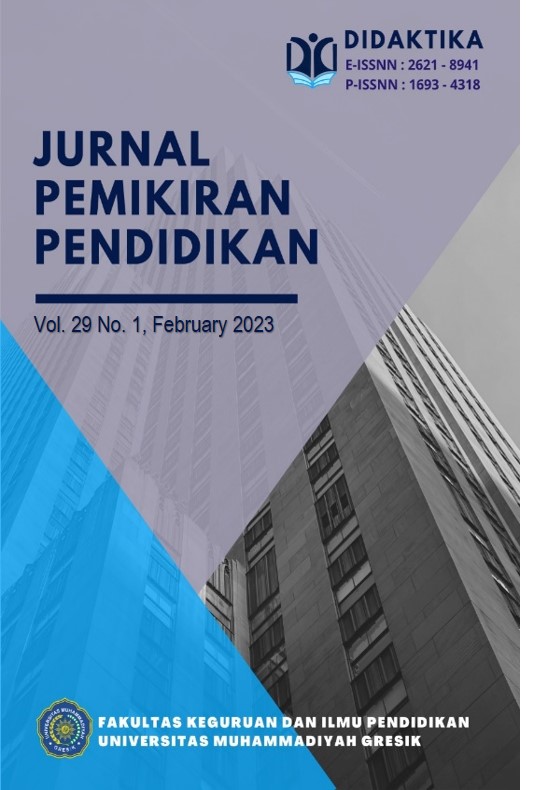Teachers’ Roles in Implementing Play-Based Learning for Teaching Vocabulary: Perspectives of Thai Primary School Teachers
DOI:
https://doi.org/10.30587/didaktika.v29i1.5230Keywords:
play-based learning; teachers’ roles; teaching vocabularyAbstract
Teachers may have different perspectives about their roles in implementing teaching methods. One of the examples is using play-based learning. This study explores the teacher's implementation of play-based learning and the roles of Thai primary school teachers in teaching vocabulary using a play-based learning strategy. The data were collected through a qualitative case study design. Two instruments were applied in this research, online observations and interviews: 50 minutes of classroom observations held through Facebook's live streaming feature and 3 hours of individual interviews with three Thai teachers from different primary schools through the Zoom meeting platform and LINE. The finding of the observation shows that all teachers have been following aspects of the observation. Meanwhile, the finding from the interview shows that teachers' roles in play-based learning: teachers act as facilitators and leaders in the context of engagement with the students; teachers act as observers, planners, and reflectors in a reflective pedagogues context; and teachers act as communicators, advisors, and connectors for the context of partnership with student's parents. This study is expected to serve as a resource and source of information for English teachers who teach young learners so they can set some useful strategies into practice in the classroom.Teachers may have different perspectives about their roles in implementing teaching methods. One of the examples is using play-based learning. This study explores the teacher's implementation of play-based learning and the roles of Thai primary school teachers in teaching vocabulary using a play-based learning strategy. The data were collected through a qualitative case study design. Two instruments were applied in this research, online observations and interviews: 50 minutes of classroom observations held through Facebook's live streaming feature and 3 hours of individual interviews with three Thai teachers from different primary schools through the Zoom meeting platform and LINE. The finding of the observation shows that all teachers have been following aspects of the observation. Meanwhile, the finding from the interview shows that teachers' roles in play-based learning: teachers act as facilitators and leaders in the context of engagement with the students; teachers act as observers, planners, and reflectors in a reflective pedagogues context; and teachers act as communicators, advisors, and connectors for the context of partnership with student's parents. This study is expected to serve as a resource and source of information for English teachers who teach young learners so they can set some useful strategies into practice in the classroom.
Downloads
Published
How to Cite
Issue
Section
License
License and Copyright Agreement
In submitting the manuscript to the journal, the authors certify that:
- They are authorized by their co-authors to enter into these arrangements.
- The work described has not been formally published before, except in the form of an abstract or as part of a published lecture, review, thesis, or overlay journal.
- That it is not under consideration for publication elsewhere,
- That its publication has been approved by all the author(s) and by the responsible authorities – tacitly or explicitly – of the institutes where the work has been carried out.
- They secure the right to reproduce any material that has already been published or copyrighted elsewhere.
- They agree to the following license and copyright agreement.
Copyright
Authors who publish with DIDAKTIKA: Jurnal Pemikiran Pendidikan agree to the following terms:
- Authors retain copyright and grant the journal right of first publication with the work simultaneously licensed under a Creative Commons Attribution License (CC BY-SA 4.0) that allows others to share the work with an acknowledgment of the work's authorship and initial publication in this journal.
- Authors are able to enter into separate, additional contractual arrangements for the non-exclusive distribution of the journal's published version of the work (e.g., post it to an institutional repository or publish it in a book), with an acknowledgment of its initial publication in this journal.
- Authors are permitted and encouraged to post their work online (e.g., in institutional repositories or on their website) prior to and during the submission process, as it can lead to productive exchanges, as well as earlier and greater citation of published work.
Licensing for Data Publication
Open Data and Software Publishing and Sharing
The journal strives to maximize the replicability of the research published in it. Authors are thus required to share all data, code or protocols underlying the research reported in their articles. Exceptions are permitted but have to be justified in a written public statement accompanying the article.
Datasets and software should be deposited and permanently archived inappropriate, trusted, general, or domain-specific repositories (please consult http://service.re3data.org and/or software repositories such as GitHub, GitLab, Bioinformatics.org, or equivalent). The associated persistent identifiers (e.g. DOI, or others) of the dataset(s) must be included in the data or software resources section of the article. Reference(s) to datasets and software should also be included in the reference list of the article with DOIs (where available). Where no domain-specific data repository exists, authors should deposit their datasets in a general repository such as ZENODO, Dryad, Dataverse, or others.
Small data may also be published as data files or packages supplementary to a research article, however, the authors should prefer in all cases a deposition in data repositories.











